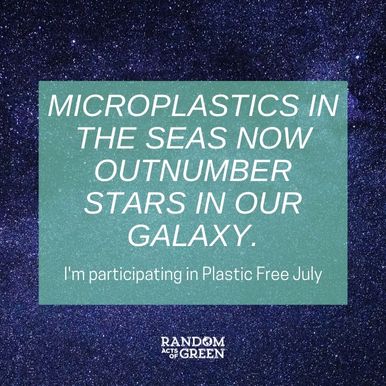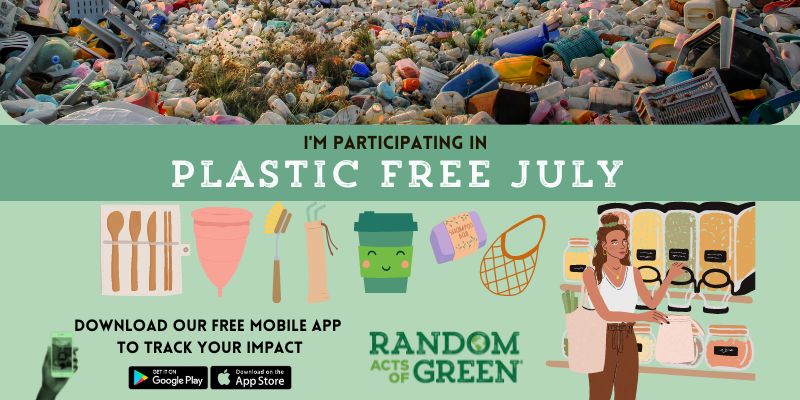
- This event has passed.
Plastic Free July Challenge Month
July 1, 2023 - July 31, 2023
Plastic Free July Eco Challenge
Random Acts of Green is joining the Plastic Free July challenge, a global movement that activates millions of people to be part of the solution to plastic pollution. Why? Here are some fast facts about the problem:
- As of 2017, the world has produced 8.3 billion metric tons of plastic. That’s more than 52 million blue whales, 1.5 billion African elephants, or 112 billion people.
- 80% of that plastic has wound up in landfills, in the ocean, in the guts of birds and animals, and everywhere in our environment.
- Every year, Canadians throw away 3 million tonnes of plastic waste, only 9% of Every year, Canadians throw away 3 million tonnes of plastic waste, only 9% of which is recycled, meaning the vast majority of plastics end up in landfills and about 29,000 tonnes finds its way into our natural environment
which is recycled, meaning the vast majority of plastics end up in landfills and about
29,000 tonnes finds its way into our natural environment

Unless we take action now, there will be more plastic in the ocean than fish by 2050 (UN).
Plastic Free July 2022
While this thought is:




we CAN do something as individuals to make a difference.
We want to help YOU take action. Start by implementing some small changes to your purchasing habits this year. Simple switches here-and-there can make all the difference.
Understand that even the smallest, most everyday plastic items can stick around for a long time.
Plastic Free July Facts
Here’s how long it takes for common-place plastics to decompose:









By swapping everyday household items, you will minimize your personal plastic footprint, which in turn will help keep our oceans and waterways plastic-free.

Plastic Free July 2022 Resources

There are over 40+ different Green Acts you can log to help track your impact.
Download it for free to get inspiration on actions you can take to help our planet.
Earn Green Points and redeem for rewards from eco-friendly businesses and services from our member community.
Details
- Start:
- July 1, 2023
- End:
- July 31, 2023
- Website:
- https://raog.ca/plastic-free-july-challenge/

